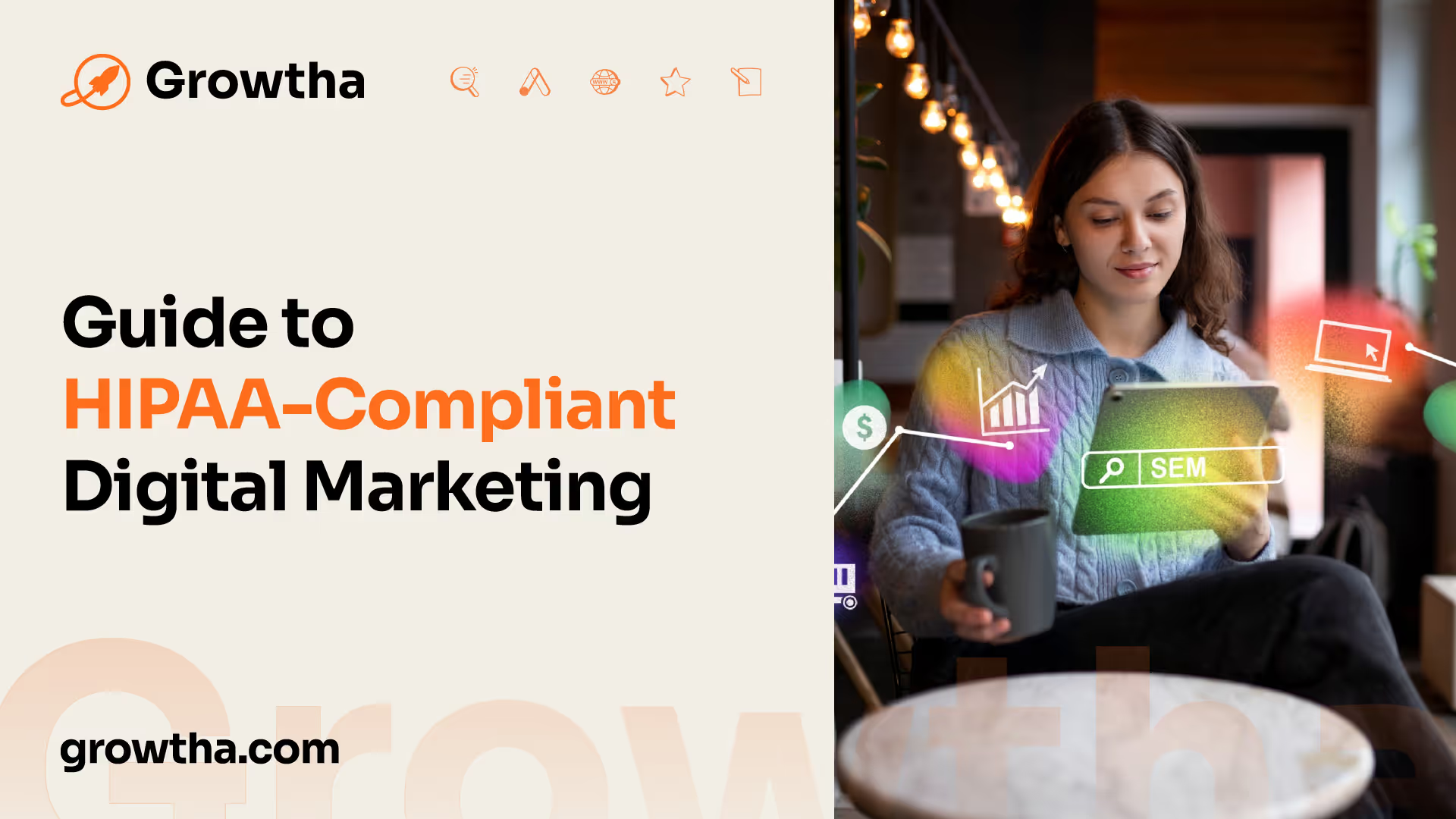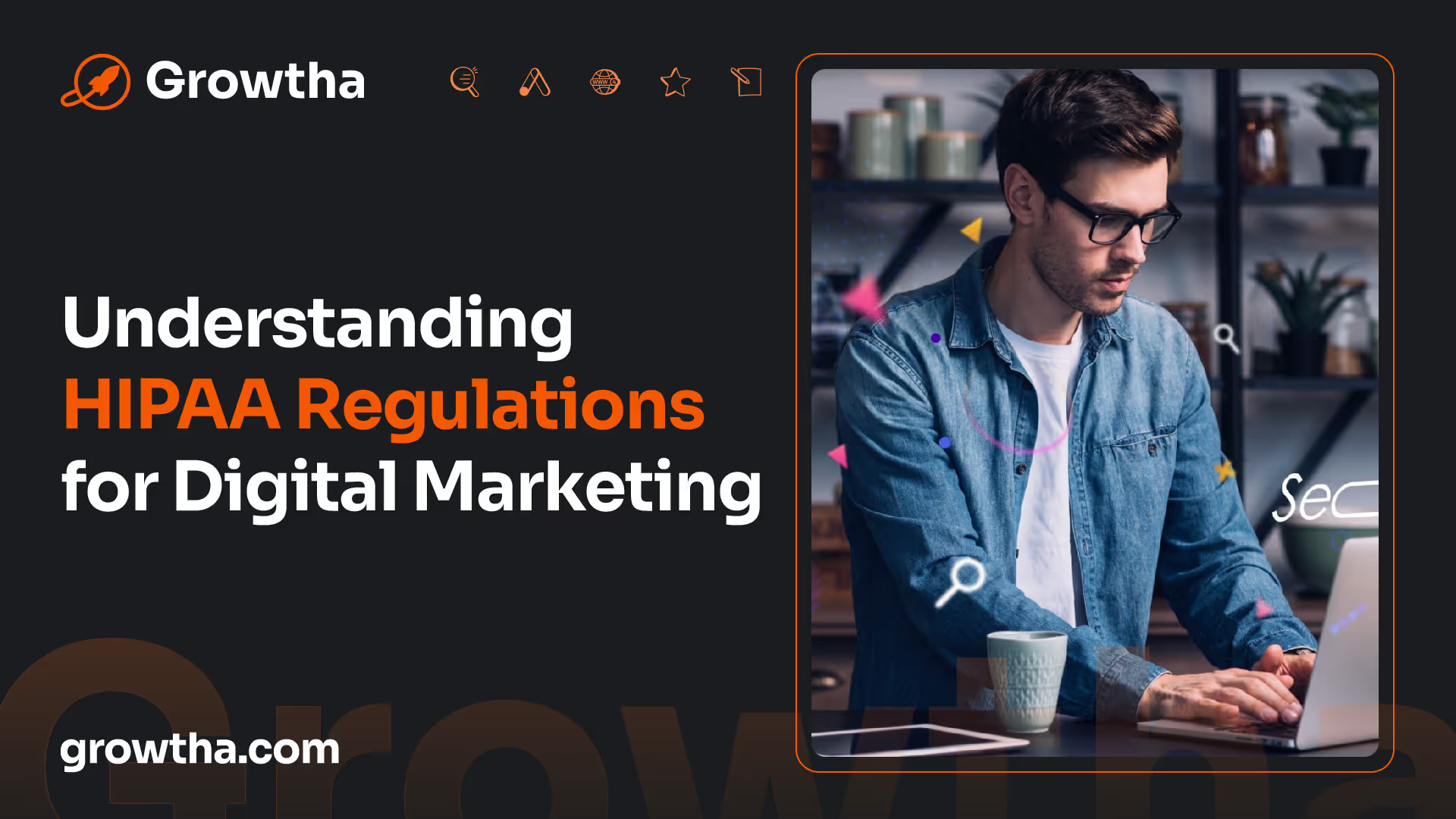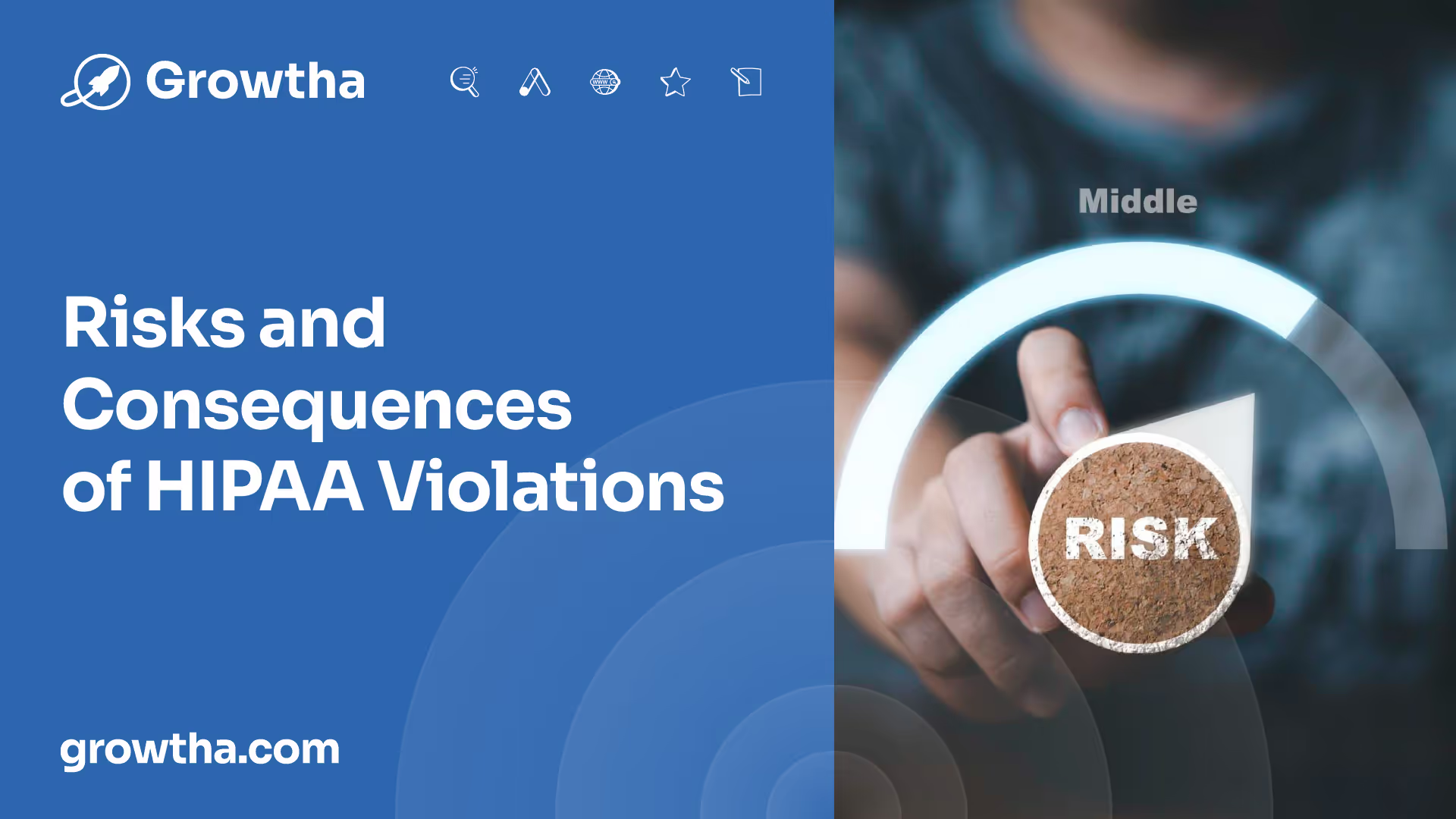Guide to HIPAA-Compliant Digital Marketing
By adhering to HIPAA regulations, healthcare marketers can strike a balance between delivering targeted and personalized marketing while safeguarding sensitive patient data.


Guide to HIPAA-Compliant Digital Marketing
The Importance of HIPAA-Compliant Digital Marketing
In the ever-evolving landscape of digital marketing, it is crucial for healthcare organizations to prioritize HIPAA compliance to protect patient health information (PHI) and maintain the trust and confidence of their patients. By adhering to HIPAA regulations, healthcare marketers can strike a balance between delivering targeted and personalized marketing while safeguarding sensitive patient data.
Protecting Patient Health Information
The Health Insurance Portability and Accountability Act of 1996 (HIPAA) created national standards to protect PHI, and the HIPAA Privacy Rule implements these requirements. Entities subject to the Privacy Rule, including healthcare providers, must follow these rules to protect PHI and adhere to HIPAA privacy regulations [1].
Safeguarding PHI is of utmost importance as it contains sensitive information about an individual's health and well-being. By implementing HIPAA-compliant digital marketing practices, healthcare organizations can ensure that patient data is secure and protected from unauthorized access, breaches, or misuse. This not only helps in compliance but also promotes patient trust and confidence in the organization's commitment to privacy and security.
Benefits of Targeted and Personalized Marketing
While the protection of patient health information is paramount, healthcare organizations can still leverage targeted and personalized marketing strategies within the bounds of HIPAA compliance. PHI, or personal health information, is crucial for targeting and personalizing patient journeys effectively. By safely managing PHI, organizations can directly access patient needs and provide proper care by targeting the right patient with the appropriate care [1].
Targeted and personalized marketing allows healthcare organizations to deliver tailored messages, educational content, and treatment options to their patients. By understanding the specific needs and preferences of patients, organizations can enhance patient engagement, improve health outcomes, and foster a stronger patient-provider relationship.
Implementing HIPAA-compliant digital marketing not only protects patient privacy but also enables healthcare organizations to deliver relevant and timely information to their patients. By using data-driven insights and segmentation techniques, organizations can ensure that their marketing efforts are focused and effective, leading to better patient experiences and outcomes.
As healthcare marketers navigate the digital landscape, it is essential to strike a balance between leveraging patient data for targeted and personalized marketing while upholding strict HIPAA compliance standards. By doing so, healthcare organizations can harness the benefits of digital marketing while safeguarding patient health information and maintaining patient trust.

Understanding HIPAA Regulations for Digital Marketing
To engage in digital marketing within the healthcare industry, it is essential to have a clear understanding of the regulations set forth by the Health Insurance Portability and Accountability Act (HIPAA). This act, specifically the HIPAA Privacy Rule, establishes national standards for protecting sensitive patient health information (PHI). Let's explore the key aspects of HIPAA regulations in the context of digital marketing.
Overview of HIPAA Privacy Rule
The HIPAA Privacy Rule sets guidelines for healthcare providers and other covered entities to protect PHI and ensure patient privacy. These rules define the permissible uses and disclosures of PHI, as well as the rights of individuals regarding their health information.
In the realm of digital marketing, the Privacy Rule dictates that organizations must handle PHI with utmost care. This includes implementing measures to safeguard PHI during marketing activities, ensuring that only authorized individuals have access to this information. By adhering to the Privacy Rule, healthcare providers can maintain patient trust and confidentiality.
HIPAA Compliance for Email Marketing
Email marketing can be a powerful tool for healthcare organizations to reach their target audience. However, when it comes to HIPAA compliance, it is crucial to implement specific controls and security measures.
To comply with HIPAA regulations, covered entities and business associates must implement various controls for email marketing. This includes access controls, audit controls, integrity controls, ID authentication, and transmission security mechanisms. Encrypting emails end-to-end is particularly vital for preserving the confidentiality of patients' PHI.
By implementing these measures, healthcare organizations can ensure that PHI shared via email is protected, reducing the risk of unauthorized access or data breaches.
Considerations for SMS Marketing
While SMS marketing can be an effective communication channel, it presents challenges in terms of HIPAA compliance. Generally, SMS messages are not considered HIPAA-eligible due to limitations in encryption and the retention of message copies on service providers' servers.
To maintain compliance and protect patient information, it is recommended to avoid including PHI in SMS messages. Instead, healthcare organizations should explore alternative communication channels that meet HIPAA requirements while still allowing for effective audience targeting.
By understanding the limitations surrounding SMS marketing and taking appropriate precautions, healthcare organizations can navigate the complexities of HIPAA compliance while still engaging with their target audience.
Understanding the regulations and requirements set forth by HIPAA is essential for digital marketers operating within the healthcare industry. By adhering to these guidelines, marketers can ensure the protection of patient health information while still effectively reaching their target audience. Consulting legal teams and utilizing HIPAA-compliant marketing automation platforms are also crucial steps to maintain compliance. By prioritizing patient privacy and implementing best practices, digital marketers can successfully navigate the HIPAA maze in their digital marketing efforts.

Risks and Consequences of HIPAA Violations
Ensuring compliance with HIPAA regulations is of utmost importance in the realm of digital marketing. Failure to comply with HIPAA regulations can result in severe penalties and have significant consequences for healthcare organizations. Let's take a closer look at the potential risks and consequences associated with HIPAA violations.
Penalties for Non-Compliance
HIPAA violations can lead to stiff penalties, including civil and criminal penalties enforced by the U.S. Department of Health and Human Services. The Office for Civil Rights (OCR) is responsible for enforcing HIPAA regulations and has the authority to impose fines on organizations that fail to comply with the Privacy Rule.
The fines for HIPAA violations can vary depending on the severity and extent of the violation. According to Cured Health, breaches of HIPAA regulations can result in fines ranging from $10,000 to $50,000. The OCR has the discretion to impose these fines based on the circumstances surrounding the violation.
Furthermore, unauthorized disclosure of protected health information (PHI) can result in significant fines. The OCR has imposed fines ranging from $100 to over $16 million for HIPAA violations, as stated by Digital Authority. The fines are determined based on the nature and extent of the violation, as well as the organization's compliance history.
Impact on Reputation and Trust
In addition to the financial penalties, HIPAA violations can have a profound impact on an organization's reputation and the trust placed in them by patients and the public. The unauthorized use or disclosure of protected health information for marketing and advertising purposes can damage patients' trust and affect their relationship with healthcare providers, as highlighted by Piwik PRO.
The breach of patient privacy can lead to a loss of confidence in the organization's ability to safeguard sensitive information, potentially resulting in patients seeking care elsewhere. The reputation of the organization may be tarnished, making it challenging to rebuild trust with patients and the community.
To mitigate these risks, healthcare organizations must prioritize HIPAA compliance in their digital marketing efforts. By implementing robust security measures, ensuring proper training for staff, and regularly auditing their systems and processes, organizations can minimize the chances of HIPAA violations and protect patient privacy.
Understanding the potential penalties and the impact on reputation and trust serves as a strong reminder of the importance of HIPAA compliance in digital marketing efforts. Healthcare organizations must remain vigilant and take the necessary steps to safeguard patient health information, not only to avoid legal consequences but also to maintain the trust and confidence of their patients.
Navigating Digital Marketing Platforms for HIPAA Compliance
When it comes to digital marketing in the healthcare industry, it's essential to navigate the various platforms while ensuring compliance with HIPAA regulations. Let's explore the limitations and considerations for Meta and Instagram advertising, Google Ads, and email marketing.
Limitations of Meta and Instagram Advertising
Meta (formerly Facebook) and Instagram advertising platforms have specific limitations when it comes to handling patient data for HIPAA-compliant companies. For instance, Meta pixels cannot be installed on pages with HIPAA-compliant password-protected portals, and there are restrictions on demographic targeting under "special ad categories" [2]. These limitations require digital marketers to carefully evaluate their ad targeting options and ensure compliance with HIPAA regulations while utilizing these platforms.
Google Ads and HIPAA Considerations
Google Ads provides powerful tools for marketers to effectively reach their target audience. However, when it comes to healthcare and pharmaceutical ads, there are additional restrictions that must be followed, in addition to HIPAA regulations [2]. Marketers need to be aware of these restrictions and ensure that their campaigns adhere to both HIPAA guidelines and Google's advertising policies.
Email Marketing and Business Associate Agreements
Email marketing continues to be a powerful tool for engaging audiences, and it is crucial for marketers working with HIPAA-compliant companies to consider specific platforms and segmentation strategies to ensure compliance with HIPAA regulations. HIPAA-compliant email marketing requires a business associate agreement (BAA) between the healthcare provider and their email service provider, ensuring the protection of patient data [3]. This agreement establishes the responsibilities and obligations of both parties in safeguarding patient information.
To maintain compliance, healthcare marketers need to choose email marketing platforms that offer HIPAA-compliant features and have the necessary security measures in place. It is essential to work with email service providers that are willing to sign a BAA, demonstrating their commitment to protecting patient data.
Navigating digital marketing platforms for HIPAA compliance requires careful consideration of the limitations and regulations associated with each platform. Marketers should work closely with legal teams to ensure that their campaigns align with HIPAA guidelines and leverage secure, encrypted messaging platforms to communicate with patients [3]. By adopting these best practices, healthcare marketers can engage their audience effectively while maintaining the privacy and security of patient information.
Best Practices for HIPAA-Compliant Digital Marketing
To ensure HIPAA compliance in digital marketing efforts, healthcare organizations should follow best practices that prioritize the protection of patient health information. Implementing these practices not only safeguards patient data but also helps maintain the reputation and success of healthcare practices.
Utilizing HIPAA-Compliant Marketing Automation Platforms
Utilizing HIPAA-compliant marketing automation platforms can streamline workflows, optimize campaigns, personalize patient outreach effectively, and enhance overall patient engagement. These platforms ensure that patient data remains secure while allowing healthcare marketers to leverage the power of automation to deliver targeted and personalized marketing content [4].
By using these platforms, healthcare organizations can automate various marketing tasks, including email campaigns, social media scheduling, and content management, while adhering to HIPAA regulations. These platforms provide the necessary infrastructure and security measures to safeguard patient information, allowing healthcare marketers to focus on delivering relevant and valuable content to their target audience.
Consulting with Legal Teams
To navigate the complexities of HIPAA regulations, it is crucial for healthcare marketers to consult with legal teams well-versed in HIPAA regulations. These legal experts can provide specific guidance tailored to the organization's needs and ensure compliance with the various requirements of the HIPAA Privacy Rule [2].
A legal team can assist healthcare marketers in understanding the intricacies of HIPAA regulations, such as the permissible uses and disclosures of patient health information in marketing campaigns. They can also help organizations develop comprehensive policies and procedures that align with HIPAA requirements, ensuring that all digital marketing efforts comply with the regulations.
Securing Patient Data and Ensuring Compliance
Implementing HIPAA-compliant tools and practices is crucial for healthcare organizations due to the sensitivity of patient information. Healthcare marketers must prioritize the security and confidentiality of patient data. This includes implementing robust data encryption, access controls, and regular security audits to protect patient information from unauthorized access or breaches.
Furthermore, healthcare organizations should provide training and education to their marketing teams to ensure they understand the regulations and the importance of compliance. Regular audits and assessments should be conducted to identify any potential vulnerabilities or gaps in compliance and address them promptly.
By securing patient data and ensuring compliance with HIPAA regulations, healthcare organizations can build trust with their patients and maintain the integrity of their digital marketing efforts.
Remember, implementing HIPAA-compliant digital marketing strategies can be complex, requiring healthcare providers to invest time, resources, and expertise to navigate the regulations effectively. By following these best practices and seeking guidance from legal professionals, healthcare organizations can successfully navigate the HIPAA maze and achieve compliant and effective digital marketing campaigns.
References
[1]: https://www.cured.health/resources/guide-to-hipaa-compliant-digital-marketing
[2]: https://tribalvision.com/navigating-hipaa-compliance-for-digital-marketers/
[3]: https://compliancy-group.com/healthcare-marketing-and-hipaa/
[4]: https://www.cardinaldigitalmarketing.com/healthcare-resources/blog/hipaa-compliant-martech/
[5]: https://www.digitalauthority.me/resources/healthcare-digital-marketing-and-hipaa/
[6]: https://www.wisevu.com/blog/understanding-digital-marketing-regulations-for-healthcare-providers-in-canada-and-the-usa/







